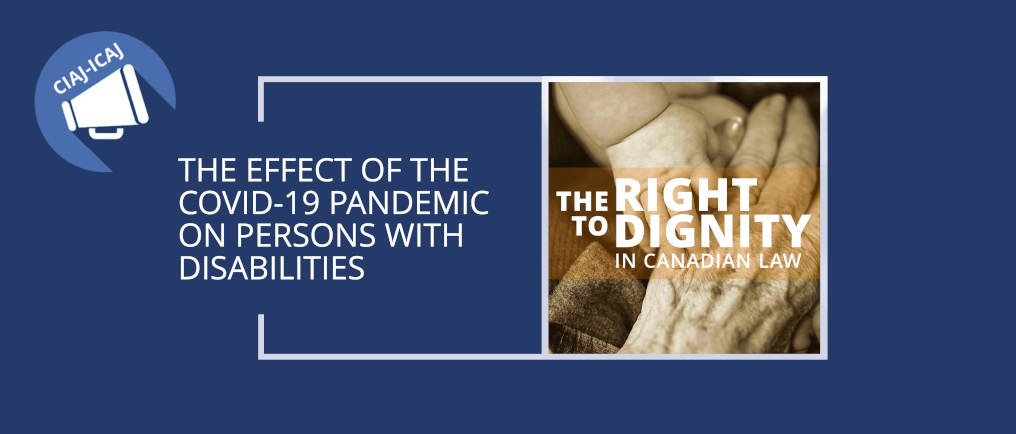The Effect of the COVID-19 Pandemic on Persons With Disabilities

The global COVID-19 Disability Rights Monitor (DRM) revealed that persons with disabilities experienced major injustices during the pandemic, including violations of rights to life, health, and liberty, as governments failed to consider people with disabilities in their emergency response protocols. Government decisions contained biases and injurious stereotypes, from delays in funding, to a lack of support workers and accessibility devices. Governments and the media took a paternalistic approach, classifying persons with disabilities as having underlying health conditions to reassure the growing agitation in the general population, while simultaneously further othering those already marginalized.
Pre-existing intersectional inequalities further compounded the social vulnerability of persons with disabilities during the pandemic. In many cases, the DRM found that public information was inaccessible for people who are visually impaired or who are hearing impaired, medical triage deprioritized those with physical and mental impairments based on biased quality of life assessments, and visitor restrictions exposed vulnerable persons to additional abuse or neglect. Women and girls trapped at home experienced heightened vulnerability to gender-based violence, those living in remote or rural areas lacked access to essentials, and many homeless people with disabilities were forced into institutional settings that lacked adequate personal protective equipment and became infectious hotspots. Low-income families lost many support services. Most disability-specific early childhood programs were not considered essential, and many online learning activities were not suitable, too difficult, or not engaging for children with disabilities. Children with disabilities were already excluded from community supports and childcare services before the pandemic, and while governments focused on reopening schools and childcare facilities, public health measures aimed to mitigate the impact on the economy, failing to consider the resources children with disabilities need to fully participate.
The UN Committee on the Rights of Persons with Disabilities emphasizes an inclusive equality, recognizing the person, the positive accommodation of difference, their equal right to belong, and the distribution of resources to accommodate this difference. Did the Canadian response to COVID-19 consider persons with disabilities? The Canadian Disability Tax Credit and Canada Emergency Student Benefit (CESB) bonus for students with disabilities aimed to address the inequities faced during the pandemic. However, due to old eligibility criteria many were excluded. Even though the Accessible Canada Act was enacted to address barriers to accessibility through consultation with persons with disabilities, and some people with disabilities found virtual platforms allowed them to participate in work, school, and culture that was otherwise inaccessible, many traditional structures proved ineffective and unethical. COVID-19 exposed the ongoing fragile nature of the support systems in place for these people. How can persons with disabilities and their representative organizations be involved in future crisis planning and policy design? What technological investments can be made to help states better accommodate persons with disabilities.
This topic and many more will be discussed at CIAJ’s 46th Annual Conference on “The Right to Dignity in Canadian Law,” which will take place October 26–28, 2022 in person in Halifax, NS, and Online.
Some seasoned panellists will be offering their expertise and personal experience on Panel 5:
Panel Chair
- The Honourable Justice P. Colleen Suche, Court of King’s Bench of Manitoba; President, CIAJ
Speakers
- Michael McNeely, Government Lawyer; Self-Advocacy Instructor, Canadian Helen Keller Centre; Accessibility Consultant and Project Developer, Inside Out
- Dr. Heidi Janz, Ph.D., Associate Adjunct Professor, John Dossetor Health Ethics Centre, University of Alberta
- Dr. Nancy Hansen, Ph.D., Associate Professor & Director, Interdisciplinary Master’s Program in Disability Studies, University of Manitoba
Panel 5 keywords: physical or mental disability, COVID-19 impacts (including lockdowns, restrictions, triage protocols, inadequate PPE, and supported decision-making), children with disabilities, the UN CRPD, genderbased violence, underlying health conditions, paternalistic government response, othering, ableism, COVID19 Disability Rights Monitor, social vulnerability, intersectionality, accessibility, crisis planning, Disability Tax Credit, CERB.
More blog posts on dignity are available on this page: https://ciaj-icaj.ca/en/blog/
Conference Overview
CIAJ’s 46th Annual Conference, entitled “The Right to Dignity in Canadian Law,” will discuss dignity as a fundamental human right. The conference will cover the many facets of the concept of dignity, from moral and philosophical notions to its uses as a legal norm. Discussion of the topic will be grounded in eminently pertinent issues such as the role of dignity in gender identity and reproductive rights, as well as medical assistance in dying, elder care, disability, and equality rights. The role of dignity will also be discussed in the context of the Canadian criminal justice and carceral systems, particularly with regards to Indigenous Peoples, restorative justice, the United Nations Declaration on the Rights of Indigenous Peoples, and reconciliation.
